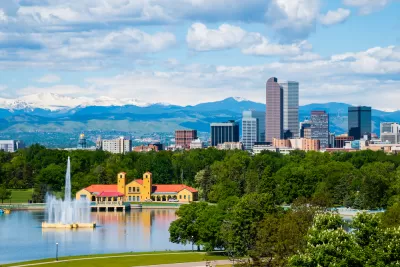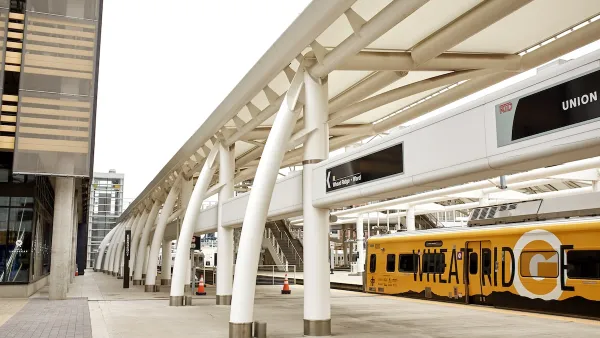Despite an early plan to run rail lines to the city’s mountain parks, they are not easily accessible to Denverites without cars.

In a story for Colorado Public Radio, Nathaniel Minor draws attention to the “very limited” public transit available to Denver residents who want to access the area’s mountain parks.
“Denver voters approved funding for the mountain park system in 1912, at a time when very few of them owned personal vehicles and many were pining to escape the city. The plan presented to voters showed two electric rail lines that would run from Golden to Bergen Park, and part way up Bear Creek Canyon from Morrison.” Yet when the parks were built, the rail lines didn’t come along with them, garnering criticism from residents.
“It was felt and understood that everybody should and would have the benefit of the public outlay and of the health and recreation so near our doors, and this not once in a while, but by quick and economic access,” wrote one resident in a 1914 op-ed.
According to Minor, “A recent strategic plan from the city calls for more shuttles — especially from rec centers in “inverted L neighborhoods” – to popular parks including Echo Lake, Genesee and Red Rocks,” but a Denver Parks and Recreation spokesperson said the agency has “no specific information” about any new transit programs. “The agency is currently dealing with a driver shortage and has no immediate plans to restore service to pre-pandemic levels, let alone expand it.”
FULL STORY: Why isn’t there public transportation to Denver’s mountain parks?

Planetizen Federal Action Tracker
A weekly monitor of how Trump’s orders and actions are impacting planners and planning in America.

Restaurant Patios Were a Pandemic Win — Why Were They so Hard to Keep?
Social distancing requirements and changes in travel patterns prompted cities to pilot new uses for street and sidewalk space. Then it got complicated.

Map: Where Senate Republicans Want to Sell Your Public Lands
For public land advocates, the Senate Republicans’ proposal to sell millions of acres of public land in the West is “the biggest fight of their careers.”

Maui's Vacation Rental Debate Turns Ugly
Verbal attacks, misinformation campaigns and fistfights plague a high-stakes debate to convert thousands of vacation rentals into long-term housing.

San Francisco Suspends Traffic Calming Amidst Record Deaths
Citing “a challenging fiscal landscape,” the city will cease the program on the heels of 42 traffic deaths, including 24 pedestrians.

California Homeless Arrests, Citations Spike After Ruling
An investigation reveals that anti-homeless actions increased up to 500% after Grants Pass v. Johnson — even in cities claiming no policy change.
Urban Design for Planners 1: Software Tools
This six-course series explores essential urban design concepts using open source software and equips planners with the tools they need to participate fully in the urban design process.
Planning for Universal Design
Learn the tools for implementing Universal Design in planning regulations.
Heyer Gruel & Associates PA
JM Goldson LLC
Custer County Colorado
City of Camden Redevelopment Agency
City of Astoria
Transportation Research & Education Center (TREC) at Portland State University
Camden Redevelopment Agency
City of Claremont
Municipality of Princeton (NJ)





























